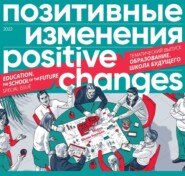По всем вопросам обращайтесь на: info@litportal.ru
(©) 2003-2024.
✖
Позитивные изменения. Тематический выпуск «Экономика будущего» (2023). Positive changes. Special issue «The economy of the future» (2023)
Настройки чтения
Размер шрифта
Высота строк
Поля
Кирилл Игнатьев: Коллеги сказали, что будущее связано с безграничными просторами космоса. Это совершенно верно, работа в дальних мирах неизбежна. Есть как минимум три «космические задачи»: скорость перемещения в пределах ближнего космоса для сверхбыстрых перелётов, ресурсы, которые на Земле в какой-то момент будут исчерпаны, удешевление наземных проектов связи и аналитики.
Новые ресурсы нам понадобятся и потому, что мы даже в высокоразвитых странах перейдём от сокращения к устойчивому росту населения. Технологии биотеха, медицины и генной инженерии приведут к росту продолжительности жизни именно в передовых государствах. Будет больше пожилого населения, долгая жизнь которого положительно компенсирует невысокую рождаемость.
На мой взгляд, особенности человеческого мира, в котором мы живем и будут жить последующие поколения, заключаются в том, что всегда, все время, вне зависимости от уровня развития, был один превалирующий главный стимул развития и человека, и экономики. Этот стимул называется «счастье». Оно может достигаться через любовь, секс, богатство, победы, через многое другое. И когда мы говорим о том, в чем будет главный стимул будущего, надо понимать, что он не изменится. Изменятся формы отношений, в том числе экономических, только и всего.
А как сделать, чтобы мир был более современным и счастливым? Наверное, приближать будущее своими мыслями, действиями, изобретениями, активностями и просто в обычной повседневной жизни. Для этого нужно преподавать футурологию именно как науку о будущем, потому что сейчас она рассказывает про будущее технологий, на стыке точных и гуманитарных наук. Расширение знаний о будущем помогает людям быстрее продвигаться вперед!
Василий Буров: Сейчас мир стал слишком зарегулирован, врачебное «не навреди» вошло в системы управления, а это тормозит развитие. Поэтому необходимо больше площадок и возможностей для экспериментов. Потому что новое – все равно прорвется, как бы мы его ни опасались. Просто нужно придумать, как жить в этом новом мире.
А вот что касается глобального продвижения футурологии – таких вещей я немного боюсь, потому что это что-то не очень понятное и плохо верифицируемое. Соответственно, вокруг такого всегда появляется много жуликов. Я полностью согласен с самой идеей продвижения, но пока непонятно, как это институционально реализовывать.
Хотя деньги на перспективные исследования, на создание прототипов и сейчас выделяются – то, что называется в мире Curiosity Science. Это и есть приближение будущего.
Артем Шадрин: Необходимо, как мне кажется, подготовить следующий шаг в масштабировании практики использования результатов исследований будущего – то, что в мире обычно называют Future Research и Futures Studies.
За последние несколько лет в ряде стран произошла институционализация практики исследований будущего, запускаются новые университетские программы, развиваются профессиональные сообщества, работают такие международные организации, как Association of Professional Futurists и World Future Society.
Методология стратегического форсайта стала уже мейнстримом, а не чем-то маргинальным, она рассматривается как важный и даже необходимый элемент в стратегическом планировании развития компаний. И это не подготовка неких предсказаний – «через 50 лет будет так-то», а, например, построение набора сценариев, исходя из которых становится возможным более обоснованно выстраивать разработку стратегий.
Это принципиально отличается от устаревших практик линейной экстраполяции экономических трендов, которые в любом случае будут меняться, хотя бы вследствие сложной взаимосвязи многих перспективных технологических и социальных изменений. А это означает, например, и необходимость использования при прогнозировании междисциплинарного подхода, которым зачастую пренебрегают.
Типичная ошибка при прогнозировании воздействия на экономику и общество какой-нибудь новой технологии или проекта заключается в том, что неявно предполагается, что в будущем все останется как было, а изменения будут связаны только с предметом рассмотрения, что очевидно не так. Поэтому формирование различных образов будущего, комплексных сценариев развития экономики и общества принципиально важно.
Если говорить еще о некоторых шагах по ускорению приближения желаемого будущего, то первое, что хотелось бы отметить – это новый этап в развитии непрерывного образования, который позволил бы использовать максимум из появляющихся в мире результатов исследований и новых практик.
Мне в этом плане нравится идея основателей московской Школы системного менеджмента о целесообразности прохождения «второго бакалавриата» в формате ДПО, который позволял бы, скажем раз в 10–15 лет, системно актуализировать набор базовых, а не только отдельных узкопрофессиональных компетенций, с учетом новых появившихся подходов в разных отраслях знаний.
Думаю, уже сейчас это решительно необходимо, например, тем, кто готовится стать директором по развитию в своей компании, а также тем, кто отвечает за управление изменениями, кого за рубежом называют Chief Reinvention Officer.
Плюс еще один важный алгоритм, помогающий движению вперед, наряду с проведением собственных оригинальных исследований – это проведение бенчмаркинга, системное выявление лучших практик и проведение с их учетом пилотных проектов для возможного тиражирования действующими организациями. То есть обеспечение ускоренной адаптации появляющихся в России и мире новых конкурентных преимуществ и успешных технологических решений.
Владимир Вайнер: На этой позитивной ноте менеджмента изменений мы заканчиваем нашу встречу. Если такой формат кажется значимым, мы можем повторять его онлайн, офлайн и в любой точке мира. Это кажется правильной задачей по приближению горизонта будущего.
Текст подготовила журналист Татьяна Печегина
Economy of the Future Through the Eyes of Futurologists. Positive Changes Journal Expert Discussion
Leading economists and futurologists met at the session organized by the Positive Changes Journal and devoted to the main topic of the special issue – the economy of the future. Will there be an increase in prosperity and where will it lead? What are the trends in economic development? What should be envisaged while building an economic development scenario? Will the economy of the future become human-centered? Are the fears of artificial intelligence justified? How will space be explored? What do we need to do to bring the kind of future we like closer? The panelists discuss this and much more. The conversation was facilitated by Vladimir Vainer, director of the Positive Changes Factory. The editorial staff publishes a transcript of the conversation.
Vasily Burov
Futurologist, advisor at the Moscow Institute of Electronics and Mathematics, HSE University, co-founder of the Information Culture NGO
Artem Shadrin
Director of the Institute of Social and Economic Design, HSE University
Kirill Ignatyev
Futurologist, Chairman of the Board of Directors of the Russian Investments Group, head of the Technical Progress and Future Economy project
Vladimir Vainer
Positive Changes Factory, Director
Vladimir Vainer: What phenomena today can be seen as signs of the economy of the future? Which of the signs will definitely lead to it, which of the trends are we to strive for, and how do we bring them closer?
It is interesting to talk about a future that is not obvious, but that can be made obvious. The way I see it, predictions can be made over a timespan of two generations. This is a kind of practical, motivational vector, so that, as they say, our children’s children are proud to say: "Our fathers invented all this back in the day.”
Kirill Ignatyev: I agree, and I would add that in the context of the economy of the present and the future, it is a good idea to measure today and tomorrow by technological paradigms. The current technological paradigm started at the end of the last century with the emergence of mobile communication and the Internet; now there is a period of transition, after which the last generation of this technological paradigm will inevitably leave and a new one will arrive. When power passes to a generation twice as young, the most important next step will follow. It defines a lot – we do not measure economic history in centuries anymore.
Artem Shadrin: Two things seem most significant to me: first, economic growth, technological development, growth in prosperity will continue with any forecast short of a catastrophe. Therefore, one of the trends will be a reduction in the amount of time people devote to paid work in the traditional model, and an increase in the share of leisure time, or activities motivated by non-economic considerations – charity, volunteerism, etc.
As the overall wealth increases, it will become possible to choose a job that may bring more satisfaction and less money. In other words, a higher average salary will be losing its significance in favor of other factors, such as a comfortable team – colleagues, management, atmosphere, and understanding of the importance of the activity carried out, its creative, non-routine nature.
The second important thing is that you will have to change faster, to be more flexible if you want to be the winner, including an economic victory. Thus, the number of enterprises for which continuous changes become the norm and which are transformed from force majeure to the practice of regular management will increase all the time. Further spread of mechanisms such as agile, corporate entrepreneurship, and corporate universities will continue.
On the other hand, in the conditions of rapid changes, small and medium-sized businesses, startups, which are more motivated and faster decision-makers than many large enterprises, will gain additional competitive advantages. This additionally raises the priority of dedicated startup financing mechanisms, such as venture capital financing and business angel investment, helping those players who are early in the enterprise lifecycle to reach a scale that allows them to operate successfully.
To summarize, an answer will be provided to the challenge associated with the need to consider the intangible, motivational component in the work. And the transformation of management tools of large companies will be guaranteed, which will lead to an acceleration of corporate innovation.
Vasily Burov: I think the story about social relationships, about involving people in the public, is very important. Right now, our general, and the one a little younger, are basically the last people to have an idea of what it is like not to be in touch all the time. It is a story about social relationships, about mutual help, etc. When the need for intermediaries linking people at different times and places disappears, it greatly changes social behavior and horizontal social relationships. New relationships have not yet been born, but there is a kind of substitute for them. I am talking specifically about the human-to-human communication in a network which has never been as dense as it is now.
Artem Shadrin: And this is facilitated by technologies, take videoconferencing for example.
Kirill Ignatyev: Continuing with the first presentation, I would like to offer a few theses from today’s "tomorrow," so to speak. First of all, two reservations must be made.
Until the current technological paradigm changes, the economy, which just recently was developing according to the global model, will become mixed (a world of blocs), as it adjusts to the adoption of sanctions, the creation of tactical alliances and conflicts. On this basis, we can foresee parallel technological services emerging in each bloc, and the growth of new forms of corruption associated not with the leading role of the state, but with the introduction and circumvention of inter-bloc restrictions. One might say that corruption is entering the global level.
And secondly, when we consider the economy of the future, we always put aside 10 % for the scenarios of the "black swan" economy, that is, in case, roughly speaking, of an apocalypse, a global catastrophe (such as a world war or a supervolcano eruption). Even the unlikely options must be considered.
As for the baseline scenario, i.e. a progressive economy, the first thing that will happen is a dramatic reduction in wage employment in companies over the horizon of two generations. Companies will be buying competencies and skills, rather than working time. And secondly, based on the current situation with aggravating global conflicts, it is obvious that the economy will get tired of stress, and we will see a major trend towards anthroponomics, that is, a human-centered economy, which will be oriented towards humane values, healthy lifestyle, values of human life, medicine, environment, etc. I foresee the role of this exact sector as the point of most important and rapid growth.
Another important point is the predictive nature of the economy, which today is defined by technologies. This trend will actually eliminate the crises of overproduction, since most of the manufacturing will be order-based. The monetization mechanisms will also change accordingly.
Вы ознакомились с фрагментом книги.
Приобретайте полный текст книги у нашего партнера:
Приобретайте полный текст книги у нашего партнера:














